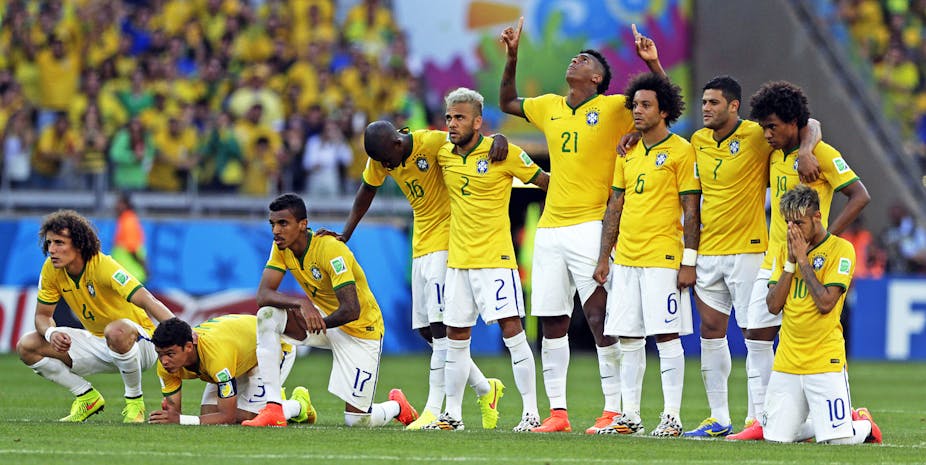The dreaded, game-deciding penalty shootouts have begun. After 120 minutes of physically and emotionally draining play, players must line up and one by one take the goalie on from the spot. Heroes and villains are made with penalties, and anyone watching – whether or not they’re supporting one of the teams involved – would sympathise with the players involved.
Since the 1982 Argentinian World Cup, 22 matches have been decided on penalty kicks. For the record, Germany has won all their penalty shoot-outs since that time (1982, 1986, 1990, and 2006). In stark contrast England have lost all of theirs (1990, 1998, and 2006), so perhaps a consolation of not making it through the group stages is not having to face that trauma again. For those with it all to come though, what does sport science research suggest footballers can do to prepare for the penalty shoot-out?
Dealing with high pressure
The training footballers receive should not only enable them to perform sporting tasks to a high standard, but also train them to deal with high pressure situations.
Our research suggests that providing specific mental toughness programmes and training under conditions of anxiety may help to prepare footballers for such high pressure scenarios.
We found that elite cricketers who were described as being “mentally tough” by their coaches were more aware of the prospect of negative repercussions from under-performing. We found that these athletes look for threats that could lead to repercussions and deal with them far in advance than their less mentally tough counterparts. In other words, their natural character trait gave them the edge through an inbuilt “early threat detection system”. This enabled them to set in motion coping strategies in order to deal with such threats early and as a result, they performed better under stress.
Great for those players, but can we apply this understanding to help those without this natural tendency? Yes, and counter-intuitively the answer is to make athletes more sensitive to threat.
Counter-intuitive thinking
We have to think counter-intuitively because a perceived threat of any nature is usually accompanied by an emotional response such as worry. Cognitive anxiety is a well-known precursor to poor performance, but this is exactly what we need to induce.
In a two-year applied intervention programme to improve mental toughness, the elite cricketers were told they would have to perform forfeits like having to wash the team’s kit or serve breakfast for failure during pressured training scenarios. The players were made aware of the likely punishments prior to every pressure scenario, along with clear instructions about what constituted the failure. The punishments were tasks that each team member wanted to avoid and gave the players opportunities to experience threats and disappointments associated with performance failure. In doing so, it sensitises the athlete to the threat that caused performance failure.
To counteract emotional responses such as worry, the research and coaching team provided the athlete with an array of coping strategies aimed at dealing with the initial performance failure. As a result, athletes regularly exposed to punishment-conditioned stimuli in the training environment, picked up threat early and dealt with it.
Athletes we worked with showed significant improvement in their coach’s rating of mental toughness and objective performance levels as a result of being in the programme over those that weren’t in the programme.
Training with constant stress
As well as training athletes to pick up and deal with threat early, a second approach is to practice under conditions of high anxiety.
It’s common for some athletes to “choke” under pressure. But regularly training under higher anxiety conditions could help acclimatise players. These conditions should closely represent the movements and emotions of the upcoming event, such as those experienced during competition (for example, ego threat and loss of financial reward). But perhaps because it better motivates players during training, typical sessions in many sports are structured so that the pressure to perform isn’t as great as that experienced during competition.
Results of experiments using a variety of simple and complex tasks showed that performers exposed to anxiety for differing numbers of practice trials performed better under pressure. Specifically, practising with anxiety in at least half of all training sessions resulted in an increase in performance in the subsequent stress test, compared to more low anxiety training.
When it comes to complex skills, introducing anxiety at a later stage of learning also resulted in improved performance compared to introducing it from the start of learning. Good performance, then, cam be maintained by at least introducing stressful conditions during practice.
Training for success in penalties at the World Cup could be the difference between putting the ball past the keeper and scuffing their shots. If teams are to improve their penalty shooting and give their takers the greatest chance of success, recent research recommends that a tailored mental toughness programme which trains footballers to detect threat early, coupled with practising under stressful conditions may just help.

